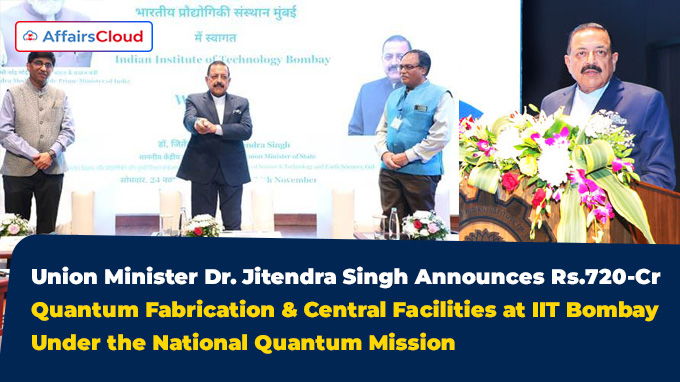In November 2025, Union Minister of State(MoS) (Independent Charge, IC) Dr Jitendra Singh, Ministry of Science & Technology (MoS&T) announced the establishment of four Quantum Fabrication & Central Facilities, at the Indian Institute of Technology(IIT) Bombay, Mumbai, Maharashtra.
- The event was attended by Dr. Sireesh, Director of IIT Bombay; Dr. Abhay Karandikar, Secretary, Department of Science & Technology (DST), MoS&T; Dr. N. Kalaiselvi, Director General (DG), Council of Scientific & Industrial Research (CSIR) ; Dr. Rajesh Gokhale, Secretary, Department of Biotechnology, MoS&T.
Exam Hints:
- What? Announcement of Four state-of-the-art Quantum Fabrication & Central Facilities
- Announced by : Union MoS(IC) Dr Jitendra Singh, MoS&T
- Where? IIT Bombay, IIT Kanpur, IIT Delhi, IISc Bengaluru
- Outlay: Rs. 720 crore under NQM
- Key Inauguration: India’s first Liquid Helium Cryogenic Facility at IIT Bombay
- Quantum Sensing Platforms Reviewed: QMagPI & QDM
- Support for Education: 100 engineering colleges to get quantum teaching labs (Rs 1 crore each)
About Quantum Fabrication & Central Facilities:
Quantum Infrastructure: The facilities were launched under the National Quantum Mission (NQM) with a total investment of Rs. 720 crore.
Institutional Coverage: The initiative will set up advanced quantum facilities at four major institutions: IIT Bombay (Maharashtra), Indian Institute of Science (IISc)Bengaluru (Karnataka), IIT Delhi (Delhi), and IIT Kanpur (Uttar Pradesh, UP).
- IIT Bombay and IIT Kanpur will lead the development of quantum sensing infrastructure, while IIT Bombay and IISc Bengaluru will focus on fabrication for quantum computing technologies, including superconducting, photonic, and spin qubits.
- IIT Delhi will act as the central hub for the development of quantum materials and devices.
Support for Quantum Education: The Government of India(GoI) announced that it will assist 100 engineering colleges nationwide in establishing quantum teaching laboratories, providing Rs 1 crore to each, as part of a broader effort to enhance India’s research capabilities in quantum technology.
Inauguration of India’s First Liquid Helium Cryogenic Facility:
During the event, Union MoS (IC) Dr. Jitendra Singh visited the Quantum Research Laboratories at IIT Bombay and officially inaugurated the India’s first Liquid Helium Facility.
Overview: Quantum computing requires dilution refrigerators that operate at extremely low temperatures of about 10 millikelvin.
- The newly inaugurated Liquid Helium Facility will support the indigenous development of these refrigeration systems, thereby strengthening India’s long-term technological self-reliance.
Technology: The facility uses a modified Claude cycle to produce over 56 liters(l) of liquid helium per hour, featuring a recovery system that recycles helium after experiments.
Cost Efficiency: The helium recovery system is designed to significantly lower operational costs, potentially reducing the expense of cryogenic experiments by nearly 10×, while conserving this rare resource.
Reviews India’s First Indigenous Quantum Sensing & Imaging Platforms:
Quantum sensing and imaging platforms: During his visit, Union MoS (IC) Dr. Jitendra Singh reviewed India’s first indigenous quantum sensing and imaging platforms.
- He was introduced to Quantum Magnetometer for Portable Imaging(QMagPI), India’s first portable magnetometer that uses Nitrogen Vacancy (NV) centers in diamond, detecting ultra-low magnetic fields at the nanotesla scale for defense, mineral exploration, and precise scientific research.
Quantum Diamond Microscope (QDM): He also witnessed India’s first QDM, built by IIT Bombay’s PQuest Group.
- The QDM allows nanoscale, three-dimensional magnetic field imaging and is poised to revolutionize widefield mapping in neuroscience, materials research, and semiconductor diagnostics.
About National Quantum Mission (NQM):
Overview: The Union Cabinet, headed by Prime Minister(PM) Narendra Modi, approved the NQM on 19th April 2023 at a total cost of Rs.6003.65 cr from 2023-24 to 2030-31, aiming to seed, nurture and scale up scientific and industrial Research and Development(R&D) and create a vibrant & innovative ecosystem in Quantum Technology (QT).
Nodal agency: It is being implemented by the Department of Science & Technology (DST) under the MoS&T.
Quantum League: India is becoming the 7th country to launch a dedicated quantum mission, following the United States of America(USA), Austria, Finland, France, Canada, and China.
Recent Related News:
In October 2025, Union Minister of State (MoS) (Independent Charge, IC) Dr. Jitendra Singh, Ministry of Science and Technology (MoS&T), has announced the development of ‘Nafithromycin’, India’s first indigenously discovered antibiotic.
- This antibiotic effectively combats drug-resistant respiratory infections, offering particular benefits to cancer patients and individuals with poorly controlled diabetes.





